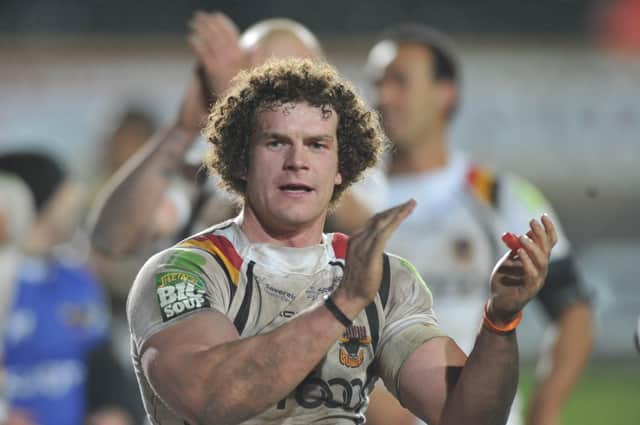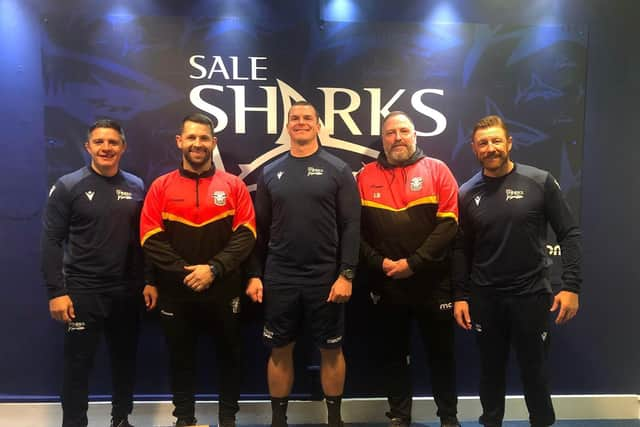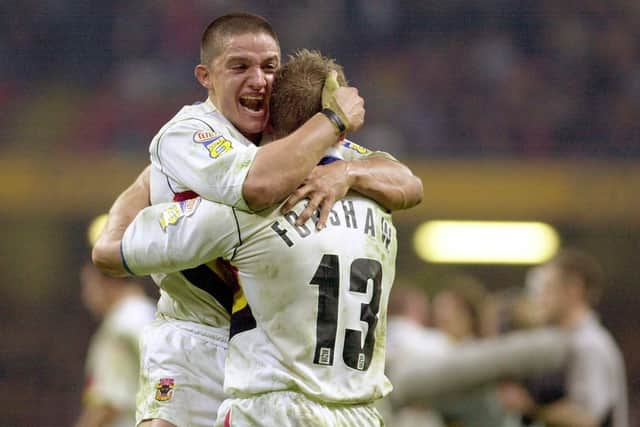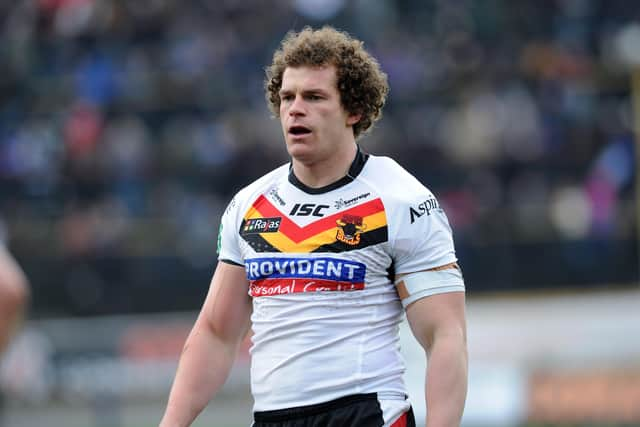Bradford Bulls legends Jamie Langley, Paul Deacon and Mike Forshaw reunited across the rugby divide with Sale Sharks


Yet the triumvirate, who helped Bradford win the treble in 2003 and between them racked up almost 750 appearances for the former Super League giants, are, indeed, working together again at the Premiership club.
Former Great Britain scrum-half Deacon switched codes in 2015, leaving his position as Wigan Warriors and England assistant to become Sale’s attack/skills coach before being promoted to head coach last December.
Advertisement
Hide AdAdvertisement
Hide AdForshaw, the industrious loose forward who earned 14 Lions caps, has been Sharks’ defence coach since 2013 but Langley – the youngest of the trio at still only 37 – is a more recent appointment.


In May, after discussions with Sharks director of rugby Alex Sanderson, he left his job as London Broncos’ assistant coach to become Sale peak performance coach, a newly-created role tasked with a more “holistic” approach to aiding players.
Speaking to The Yorkshire Post, Langley admitted: “You never know where life will take you.
“I’ve never been one to plan ahead. I’ve never had a three or five-year plan. I’ve always just wanted to do the best job I can right now. I’d spoken to Deacs occasionally but nothing to do with Sale. I’d just be asking general questions about his coaching methodology, how he finds certain players and things.
Advertisement
Hide AdAdvertisement
Hide Ad“It was more through Al (Sanderson) that the connection was made but having Deacs and Forsh’ here is brilliant as you already have two existing relationships. It’s much easier to integrate when you know people.


“And it is brilliant here. Deacs had no aspirations to go into union. He was really happy coaching in league with Wigan and at England at that time and it was just a chance opportunity presented to him. It came out of the blue.
“He said ‘why not?’ He’s never looked back, is doing brilliantly and Forsh’ has been in rugby union a lot longer, starting in S and C and now being one of the top defence coaches in the country.
“It’s great working with those lads, especially for me learning the game. Who’d have thought 15 and 20 years down the line our paths would converge again?”
Advertisement
Hide AdAdvertisement
Hide AdIndeed, it was only by chance that Wakefield-born Langley, the former England loose forward, found himself at Sale. A big believer in CPD (Continuing Professional Development), while working at Broncos – and away from the rugby league heartlands – he branched into other sports and sporadically visited Saracens, where Sanderson was an integral member of the three-times European champions’ coaching staff.


When Sanderson, 42, was appointed by Sale in January, he looked to bring in changes, including a unique role for Langley.
“We spend a lot of time with players reviewing their technical and tactical game,” he explained.
“But more often than not you forget about the person beneath it all and the process it takes to become that player who can execute a plan. Where my role comes in is I spend a lot of time around the people within the club working with players individually and in small groups and just trying to help them in any way I can to facilitate their best performance.
Advertisement
Hide AdAdvertisement
Hide Ad“It’s so they can be as resilient as they possibly can to be able to provide a good consistent performance day to day, week to week, month to month so we don’t get those ebbs and flows you sometimes get in the year: it’s to help them perform optimally.”
There are various ways in which Langley can instigate that.
“We look at things like learning more about themselves: what drives them, what makes them tick, why they are how they are and believe certain ways.
“But also why they have certain characteristics, why certain things are important to them, how they handle pressure, how they regulate their emotions – on and off the field – how they form new habits and break habits around performance.
“We look at how to take distractions away, focus their attention, look at self-control, how they look at tension in key moments.
Advertisement
Hide AdAdvertisement
Hide Ad“Then there’s how breathing and sleep can help with resilience and how you can control your cortisol levels so you can have more longevity, not just on the field but in life. We’re trying to gravitate the players towards their best fit: what’s going to be the biggest needle move for them over that time – and how we can get the most bang for our buck.”
Some of Bradford’s coaching staff – Leigh Beattie and Michael Piper – visited Sale’s training facilities last week to take a look.
On his own impact so far, Langley said: “We’ve had some really good feedback. You can get lots of small wins early doors and we do feel like we’ve been able to help a lot of players in different areas.
“It’s very gratifying but at the end of the day it’s all about the players and team; if you can help someone in one small area by just one or two per cent improvement then the compound effect across the team can be vast over time.
Advertisement
Hide AdAdvertisement
Hide Ad“Initially, you get some questions and maybe scepticism but it’s how you communicate those things and the rationales that you give. It’s letting people know you are there to help them. And you genuinely care.
“It’s an area I’ve always been interested in. If you start early enough, at 16 or 17 years old, by the time they are 20 or 21 you could have a very well-rounded player, athlete and person.”
It will be interesting to see if other clubs follow Sale’s lead.
Comment Guidelines
National World encourages reader discussion on our stories. User feedback, insights and back-and-forth exchanges add a rich layer of context to reporting. Please review our Community Guidelines before commenting.